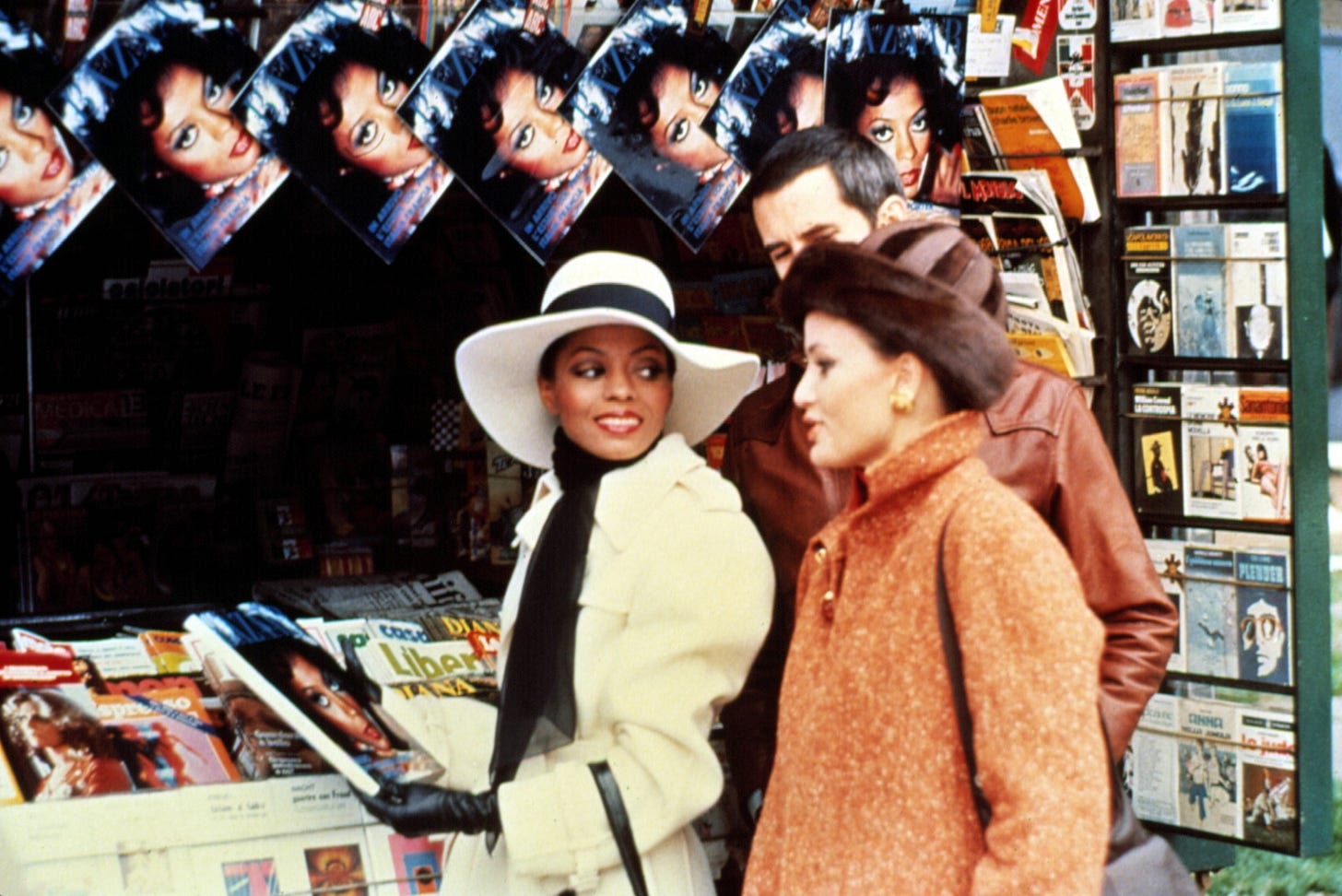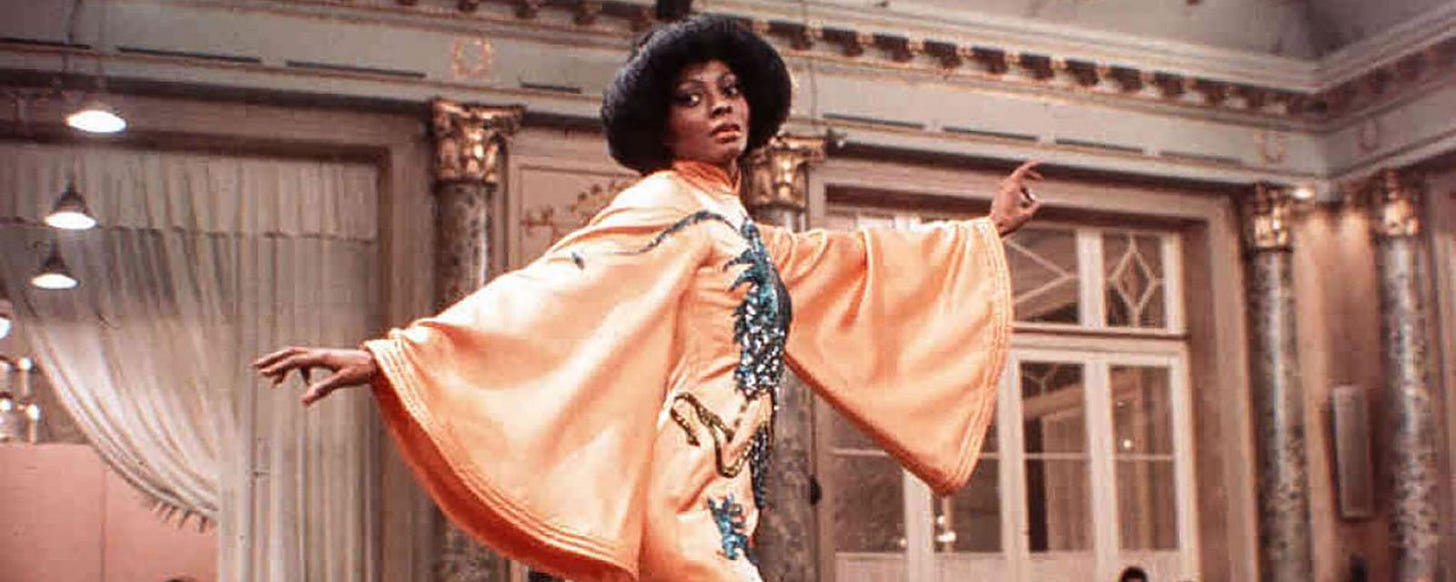Welcome back to my “Black Film Streaming Pick” series, a continuous column about Black films currently available on streaming platforms. If you haven’t already, take a look at my last pick: Billy Woodberry’s slice of life indie set in Watts during the late 1970s — Bless Their Little Hearts, which is still available on the Criterion Channel.
For this edition I decided to highlight a Diana Ross classic: Mahogany.
By 1975, former Supremes singer Diana Ross was an Academy Award nominated actress for her debut, the Billie Holliday biopic Lady Sings the Blues (and I’d make the case she should’ve won over Liza Minelli). With her second film Mahogany, she hoped to recapture the magic of her earlier success. The film reteamed her Lady co-star, the ever-so-cool Billy Dee Williams as a local Chicago activist-turned politician with a lustful eye cast towards hopeful fashion designer Tracy Chambers (Ross).
British filmmaker Tony Richardson (Tom Jones) boarded the project too. But midway through production, Berry Gordy, the founder of Motown, and Ross’ former beau, “did not feel Richardson was capturing the feeling of ‘blackness’ necessary to the story of a girl from the Chicago ghetto who achieves success as an international fashion model and designer,” per a New York Times (1975) article. He fired the acclaimed filmmaker and replaced him with himself as director.
Last night I watched Mahogany for the first time in years. It was among my dad’s favorite movies (particularly because it features one of his favorite actresses: Beah Richards of Guess Who’s Coming to Dinner fame as Ross’ mother). And upon re-watch, I remembered why it originally captured, surprised, and enraptured me.
In the decades since its released, many have disregarded the film with a backhanded compliment of “great gowns. beautiful gowns.” The movie packs plenty of depth with regards to early 1970s politics, the pitfalls of the fashion world, and the kind of sacrifices given to a dream that ultimately hollows out the dreamer.
Chambers is a design student and assistant who can’t seem to buy a break. Mostly because the white gatekeepers in Chicago dismiss her colorful designs. Her stunted career, as you can guess, is racially motivated. When famed fashion photographer Sean McAvoy (Anthony Perkins) tries to use Chambers as a model, her boss vetoes the idea: The people who run and read the magazine, in the boss’ words, have “conservative” tastes. But McAvoy believes he can make Chambers star if she’ll only come with him to Paris to prove herself.
Chambers is often caught between whether to pursue her career or aim for love. She first meets Brian Walker (Williams) as he bellows through a bullhorn advocating for fairer housing. They form a quick spark (in truth, it doesn’t take much to fall for Williams). But Brian is old school. He puts his career ahead of Chambers’ designer dreams, what he considers a frivolous venture in the face of the mounting political challenges facing Chicago’s impoverished Black community. She leaves him for the promises offered by Sean in Rome, where Sean makes her an in-demand model and renames her: Mahogany.
The filmmaking isn’t always there by Gordy. He tumbles through scenes of visual excess; and sometimes the tone of the movie can shift without reason. Berry is also not really much of an actors director; which doesn’t inhibit Perkins or Williams at all. But can sometimes work against Ross.
Even so, this is a movie about a Black woman creative moving through white spaces, areas that either make her feel invisible or exoticizes her. Sean, in particular, a closeted gay man, becomes controlling of his muse. Brian also becomes possessive. There’s a tussle for a gun between Sean and Brian wherein Perkins is absolutely demented. The sneer that comes across his face is a wild animalistic ecstasy that evades definition.
And yet, I’m most captivated by Ross. It’s still unbelievable she never took on more movies (The Wiz was her last theatrical film role with two tv movies sprinkled in during the 1990s). Assured, stylish and ravishing — you can see how open she is in front of a camera. In one scene she energetically sings in her cramp apartment, bounding from wall to wall. In another she outcharms Williams while pretending to be a married mother of six from the South side. And in others she feels the weight of disbelief; how the men in her life won’t take her seriously or only see her as an opportunity for sex.
And then there are the gowns. Ross designed the costumes for the film while Susan Gertsman, the daughter of a California clothing manufacturer, acted as the wardrobe coordinator. Every one of the threads is so 70s, it hurts. A gaudy heap of a million influences, from kabuki to Art Nouveau, crescendoing from a wave of working girl looks to over-the-top show-stopping dresses.
While the ending to Mahogany doesn’t really take Brian to task for seemingly becoming just another empty politician, and sees Chambers give up on her career in Rome to become a wife (for all we know, maybe she continues her work in Chicago), there are enough highs, particularly the interest in a Black woman balancing her ambitions and her romantic spirit, that not only makes Mahogany a classic (ahead of its time). But a testament to range Ross had within herself.
Mahogany is available to stream on Youtube.





